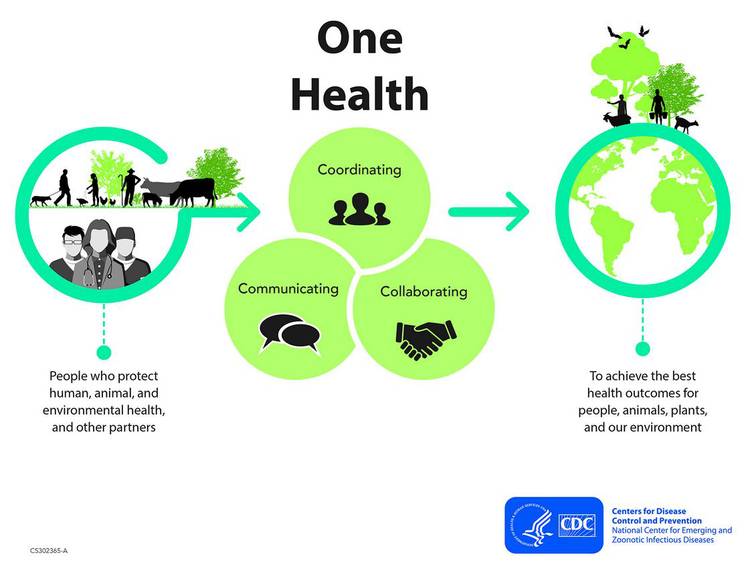Why One Health?

Why One Health?
- Worldwide, nearly 75 percent of all emerging human infectious diseases in the past three decades originated in animals.
- Environmental health may affect human and animal health through contamination, pollution and poor conditions that may lead to new infectious agents.
- The world population is projected to grow from 7 billion in 2011 to 9 billion by 2050.
- To provide adequate healthcare, food and water for the growing global population, the health professions, and their related disciplines and institutions, must work together.
- The human-animal bond beneficially impacts the health of both people and animals.
See 'What is One Health?'
One Health is a collaborative, multisectoral, and trans-disciplinary approach - working at local, national, and global levels – to achieve optimal health and well-being outcomes recognizing the interconnections between people, other animals, plants, and their shared environment.

US Centers for Disease Control and Prevention (CDC) One Health Infographic
Scope of One Health
- Agricultural production and land use
- Animals as Sentinels
- Antimicrobial Resistance - a quintessential One Health issue
- Biodiversity / Natural Resources Conservation
- Biosurveillance for Disease prevention and response
- Changing Climate
- Comparative Biology / Translational Research / Diseases common to both animals and people, cancer, diabetes, obesity
- Convergence of human, animal, and plant health and the health of the environment
- Disaster preparedness and response
- Economics / Complex Systems, Civil Society
- Environmental Health / contamination detection and response
- Food and Water Safety and Security
- Global trade and commerce
- Human-animal bond
- Interprofessional relationships / sharing of knowledge (clinical and basic)
- Non- Communicable / Chronic Diseases
- Plant and Soil health
- Planetary Health
- Professional education and training
- Public policy and regulation
- Vector-borne Disease Prevention and Treatment
- Welfare / Well-being of animals, humans, planet
- Zoonotic Diseases that pass between animals and humans
Potential Outcomes from the One Health Approach
- More interdisciplinary programs in education, training, research, and established policy
- More information sharing related to disease detection and diagnosis as well as education and research
- More prevention of diseases, both infectious and chronic diseases
- New therapies and approaches to treatment for unmet needs
The editors of the One Health Commission website do not accept any liability for the accuracy and completeness of the information supplied, for deviations from the content of the original documents, for mistakes in documents generated for the web pages, or for changes in the information available on the server made by unauthorized persons.






